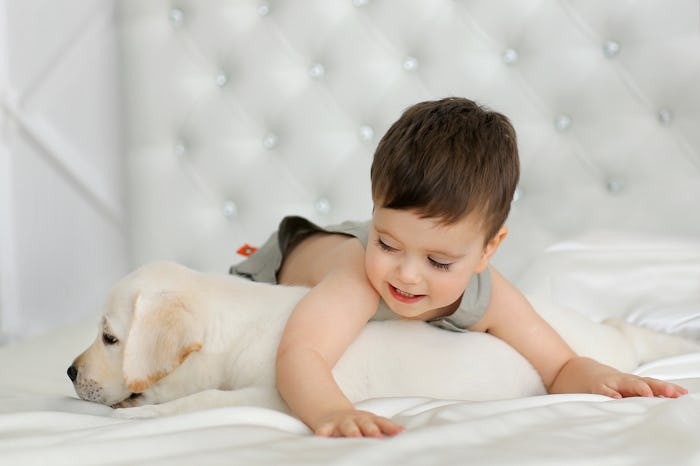Life

Here's How To Tell If Your Dog Thinks There's Something Wrong With Your Baby
Dealing with animals my entire life, whether it was tending to several pets, working in animal rescue, or even working at a pet food and supply store, I’ve heard so many fascinating and amazing stories of animals doing incredible things. Animals are way smarter than we give them credit for, and I’ve heard it all, including stories of animals telling their humans they’re sick before the human realizes. Cats and dogs are very intuitive, and their senses are extremely sensitive. What about with your child? What are some signs your dog is trying to tell you something is wrong with the baby? Should you pay more attention to how your dog is acting, or are they just dogs being silly dogs?
Los Angeles-based certified dog and cat behaviorist and trainer Russell Hartstein says in an email interview with Romper, “First is to understand and know your dog. If your dog’s behaviors are outside of the norm of their typical behavior, I would definitely take note.” Is your dog acting obsessive or acting outside of their normal behavior toward your baby? They could be trying to alert you to something going on that you don’t notice. “What harm can it do to get checked up by a doctor if your dog is acting obsessed with something or acting outside of their normal behavior toward your baby?” Hartstein asks.
Hartstein gave the incredible example of a client of his whose dog alerted her she had breast cancer, and it actually saved her life. “The dog was constantly focused on and resting on the mother's breast. The dog was pawing at it and whining while focused on it. This was totally outside of the dog's normal behavior,” Hartstein says. “The mother decided to get it checked with her doctor at her checkup, and lo and behold it was determined that she had breast cancer that was luckily detected at an early stage. Had it not been for her dog's insistent and odd behavior change around her breasts — and equally important the mother taking notice and taking seriously the behavior change of the dog — the outcome might have been drastically different.”
And if you have cats instead of dogs, they can do the same thing. When I worked in a law firm's marketing department, the CMO told all of us that even her cat helped her detect her ovarian cancer. One cat in particular of hers, who was never a lap cat or super affectionate, was suddenly very focused on her lower abdomen all the time. The cat would meow and paw at her lower abdomen, and constantly lay there. At first she just brushed it off as the cat finally coming around, but one day when the cat jumped up, she felt some horrible pain, and that prompted her to get checked out by the doctor — it turned out she had pretty late stage ovarian cancer. She says she wishes she listened to her cat sooner, but she did turn out OK and is doing great and cancer free now.
How do our pets know what’s going on inside our bodies before we do? Hartstein says, “My guess (since dogs don’t speak English) is their incredible olfactory glands. This seems to be the most obvious and plausible supposition. There is still so much we don’t know about dogs and their abilities. To unequivocally rule out these possibilities would be myopic and foolish.”
Is it weird that my CMO’s cat detected an illness and cared enough to tell her human? Most cats get a bad wrap for being very aloof. Hartstein says, “Cats also have incredibly sensitive olfactory glands and can detect minute traces of chemicals and smells that we could hardly dream of. Some cats are more independent than others. If compared to dogs (which I don’t recommend doing, but many will) they are not as social or dependent on their humans. But cats are very social, trainable and loving animals just different than dogs.” So don't rule out your cat's love for you. They just show it in different ways.
You hopefully know your pets pretty well. If you notice them acting out of the norm, or if they’re obsessing over your baby — whether it’s suddenly or just in a different way — it never hurts to get them checked out. Your pediatrician may be unsure if you tell them your pet was acting “off” toward your kid, but hey, motherly hunch, right?
Check out Romper's new video series, Bearing The Motherload, where disagreeing parents from different sides of an issue sit down with a mediator and talk about how to support (and not judge) each other’s parenting perspectives. New episodes air Mondays on Facebook.